Impact of Law & Social Policy on Learning Disability Nursing & SW
VerifiedAdded on 2023/01/12
|7
|2717
|37
Essay
AI Summary
This essay critically reflects on the impact of law and social policy, particularly the Mental Capacity Act 2005, on learning disability nursing and social work. It examines safeguarding measures, abuse of vulnerable adults, and the legislative frameworks that support nursing and social work practices. The reflection incorporates personal experiences from a placement, highlighting the importance of multi-agency collaboration and the challenges in ensuring the safety and well-being of vulnerable individuals. The essay also touches on the importance of healthcare professionals being aware of their roles and responsibilities, including safeguarding vulnerable adults and providing acute holistic care to patients who have suffered abuse. The essay concludes by emphasizing the need for increased knowledge and awareness among healthcare professionals to effectively protect vulnerable adults from abuse.
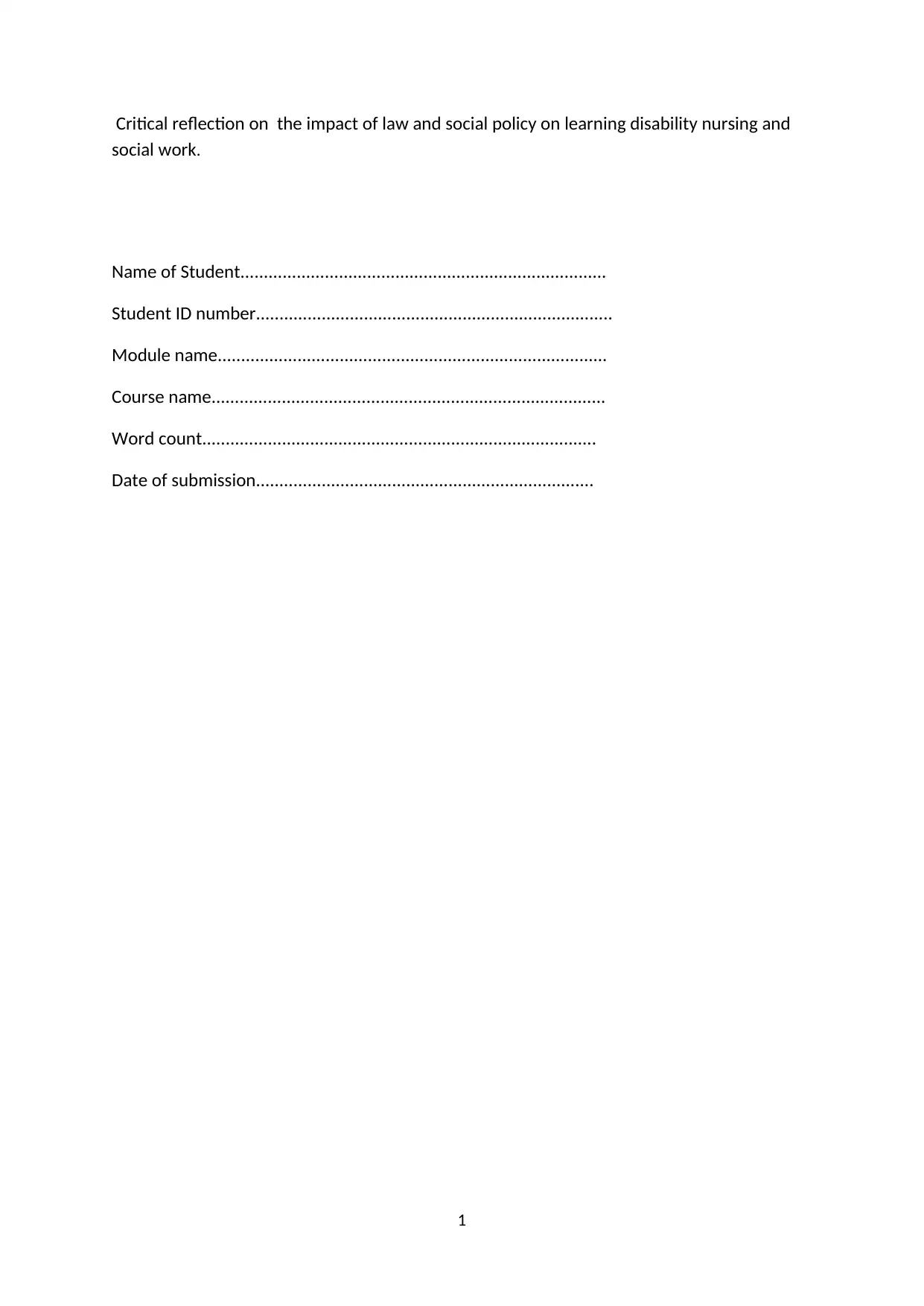
Critical reflection on the impact of law and social policy on learning disability nursing and
social work.
Name of Student..............................................................................
Student ID number............................................................................
Module name...................................................................................
Course name....................................................................................
Word count....................................................................................
Date of submission........................................................................
1
social work.
Name of Student..............................................................................
Student ID number............................................................................
Module name...................................................................................
Course name....................................................................................
Word count....................................................................................
Date of submission........................................................................
1
Paraphrase This Document
Need a fresh take? Get an instant paraphrase of this document with our AI Paraphraser
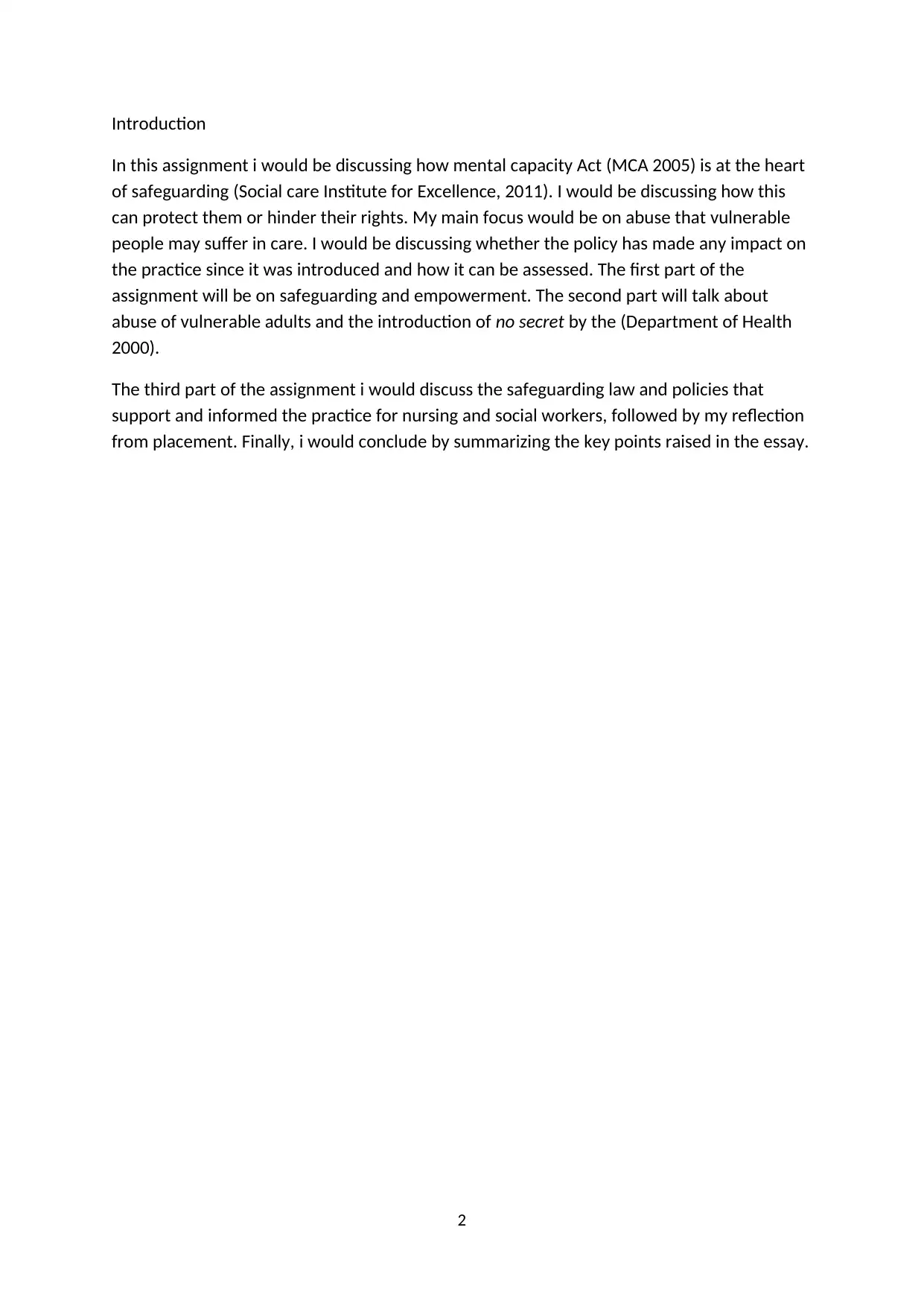
Introduction
In this assignment i would be discussing how mental capacity Act (MCA 2005) is at the heart
of safeguarding (Social care Institute for Excellence, 2011). I would be discussing how this
can protect them or hinder their rights. My main focus would be on abuse that vulnerable
people may suffer in care. I would be discussing whether the policy has made any impact on
the practice since it was introduced and how it can be assessed. The first part of the
assignment will be on safeguarding and empowerment. The second part will talk about
abuse of vulnerable adults and the introduction of no secret by the (Department of Health
2000).
The third part of the assignment i would discuss the safeguarding law and policies that
support and informed the practice for nursing and social workers, followed by my reflection
from placement. Finally, i would conclude by summarizing the key points raised in the essay.
2
In this assignment i would be discussing how mental capacity Act (MCA 2005) is at the heart
of safeguarding (Social care Institute for Excellence, 2011). I would be discussing how this
can protect them or hinder their rights. My main focus would be on abuse that vulnerable
people may suffer in care. I would be discussing whether the policy has made any impact on
the practice since it was introduced and how it can be assessed. The first part of the
assignment will be on safeguarding and empowerment. The second part will talk about
abuse of vulnerable adults and the introduction of no secret by the (Department of Health
2000).
The third part of the assignment i would discuss the safeguarding law and policies that
support and informed the practice for nursing and social workers, followed by my reflection
from placement. Finally, i would conclude by summarizing the key points raised in the essay.
2
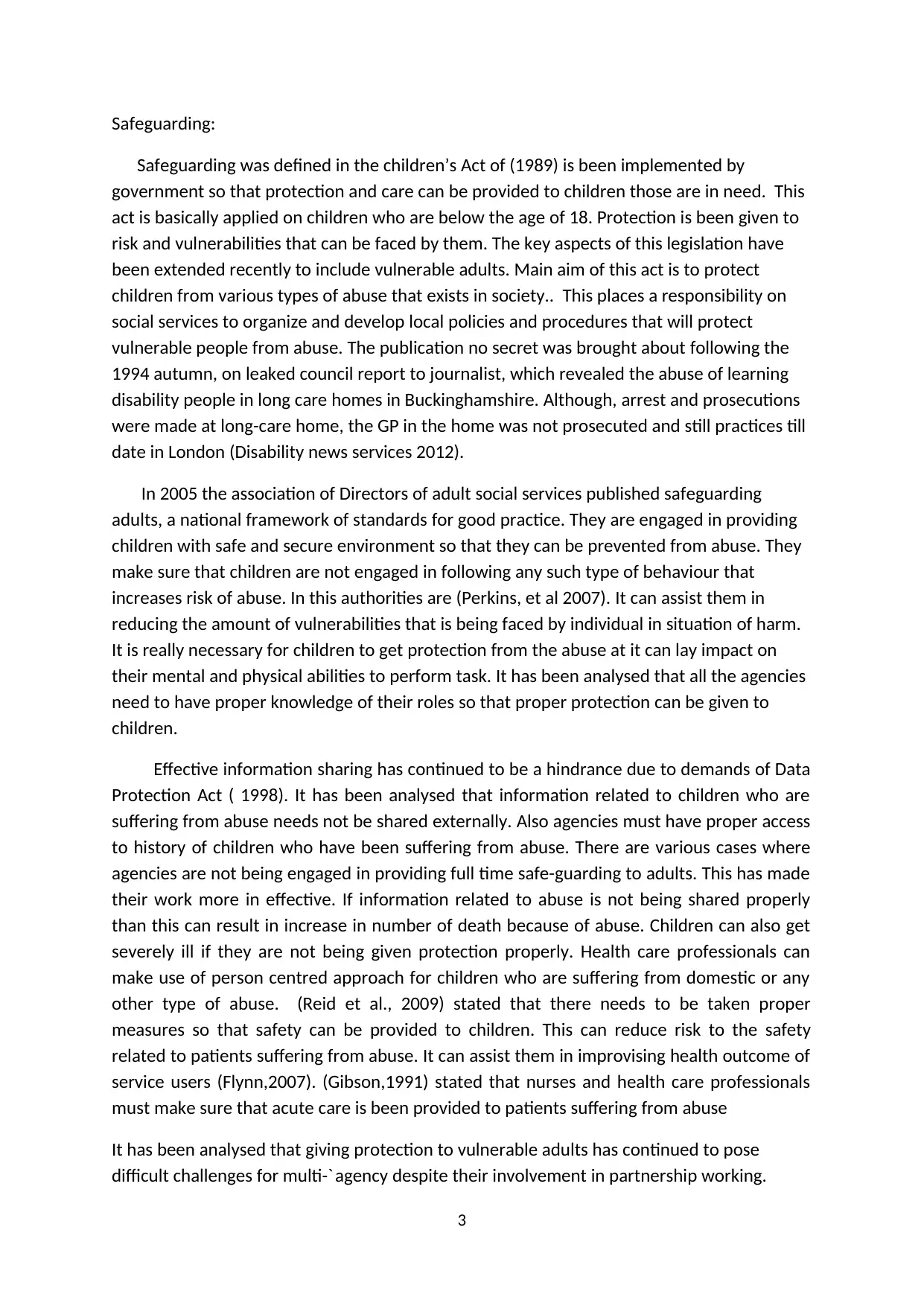
Safeguarding:
Safeguarding was defined in the children’s Act of (1989) is been implemented by
government so that protection and care can be provided to children those are in need. This
act is basically applied on children who are below the age of 18. Protection is been given to
risk and vulnerabilities that can be faced by them. The key aspects of this legislation have
been extended recently to include vulnerable adults. Main aim of this act is to protect
children from various types of abuse that exists in society.. This places a responsibility on
social services to organize and develop local policies and procedures that will protect
vulnerable people from abuse. The publication no secret was brought about following the
1994 autumn, on leaked council report to journalist, which revealed the abuse of learning
disability people in long care homes in Buckinghamshire. Although, arrest and prosecutions
were made at long-care home, the GP in the home was not prosecuted and still practices till
date in London (Disability news services 2012).
In 2005 the association of Directors of adult social services published safeguarding
adults, a national framework of standards for good practice. They are engaged in providing
children with safe and secure environment so that they can be prevented from abuse. They
make sure that children are not engaged in following any such type of behaviour that
increases risk of abuse. In this authorities are (Perkins, et al 2007). It can assist them in
reducing the amount of vulnerabilities that is being faced by individual in situation of harm.
It is really necessary for children to get protection from the abuse at it can lay impact on
their mental and physical abilities to perform task. It has been analysed that all the agencies
need to have proper knowledge of their roles so that proper protection can be given to
children.
Effective information sharing has continued to be a hindrance due to demands of Data
Protection Act ( 1998). It has been analysed that information related to children who are
suffering from abuse needs not be shared externally. Also agencies must have proper access
to history of children who have been suffering from abuse. There are various cases where
agencies are not being engaged in providing full time safe-guarding to adults. This has made
their work more in effective. If information related to abuse is not being shared properly
than this can result in increase in number of death because of abuse. Children can also get
severely ill if they are not being given protection properly. Health care professionals can
make use of person centred approach for children who are suffering from domestic or any
other type of abuse. (Reid et al., 2009) stated that there needs to be taken proper
measures so that safety can be provided to children. This can reduce risk to the safety
related to patients suffering from abuse. It can assist them in improvising health outcome of
service users (Flynn,2007). (Gibson,1991) stated that nurses and health care professionals
must make sure that acute care is been provided to patients suffering from abuse
It has been analysed that giving protection to vulnerable adults has continued to pose
difficult challenges for multi-` agency despite their involvement in partnership working.
3
Safeguarding was defined in the children’s Act of (1989) is been implemented by
government so that protection and care can be provided to children those are in need. This
act is basically applied on children who are below the age of 18. Protection is been given to
risk and vulnerabilities that can be faced by them. The key aspects of this legislation have
been extended recently to include vulnerable adults. Main aim of this act is to protect
children from various types of abuse that exists in society.. This places a responsibility on
social services to organize and develop local policies and procedures that will protect
vulnerable people from abuse. The publication no secret was brought about following the
1994 autumn, on leaked council report to journalist, which revealed the abuse of learning
disability people in long care homes in Buckinghamshire. Although, arrest and prosecutions
were made at long-care home, the GP in the home was not prosecuted and still practices till
date in London (Disability news services 2012).
In 2005 the association of Directors of adult social services published safeguarding
adults, a national framework of standards for good practice. They are engaged in providing
children with safe and secure environment so that they can be prevented from abuse. They
make sure that children are not engaged in following any such type of behaviour that
increases risk of abuse. In this authorities are (Perkins, et al 2007). It can assist them in
reducing the amount of vulnerabilities that is being faced by individual in situation of harm.
It is really necessary for children to get protection from the abuse at it can lay impact on
their mental and physical abilities to perform task. It has been analysed that all the agencies
need to have proper knowledge of their roles so that proper protection can be given to
children.
Effective information sharing has continued to be a hindrance due to demands of Data
Protection Act ( 1998). It has been analysed that information related to children who are
suffering from abuse needs not be shared externally. Also agencies must have proper access
to history of children who have been suffering from abuse. There are various cases where
agencies are not being engaged in providing full time safe-guarding to adults. This has made
their work more in effective. If information related to abuse is not being shared properly
than this can result in increase in number of death because of abuse. Children can also get
severely ill if they are not being given protection properly. Health care professionals can
make use of person centred approach for children who are suffering from domestic or any
other type of abuse. (Reid et al., 2009) stated that there needs to be taken proper
measures so that safety can be provided to children. This can reduce risk to the safety
related to patients suffering from abuse. It can assist them in improvising health outcome of
service users (Flynn,2007). (Gibson,1991) stated that nurses and health care professionals
must make sure that acute care is been provided to patients suffering from abuse
It has been analysed that giving protection to vulnerable adults has continued to pose
difficult challenges for multi-` agency despite their involvement in partnership working.
3
⊘ This is a preview!⊘
Do you want full access?
Subscribe today to unlock all pages.

Trusted by 1+ million students worldwide
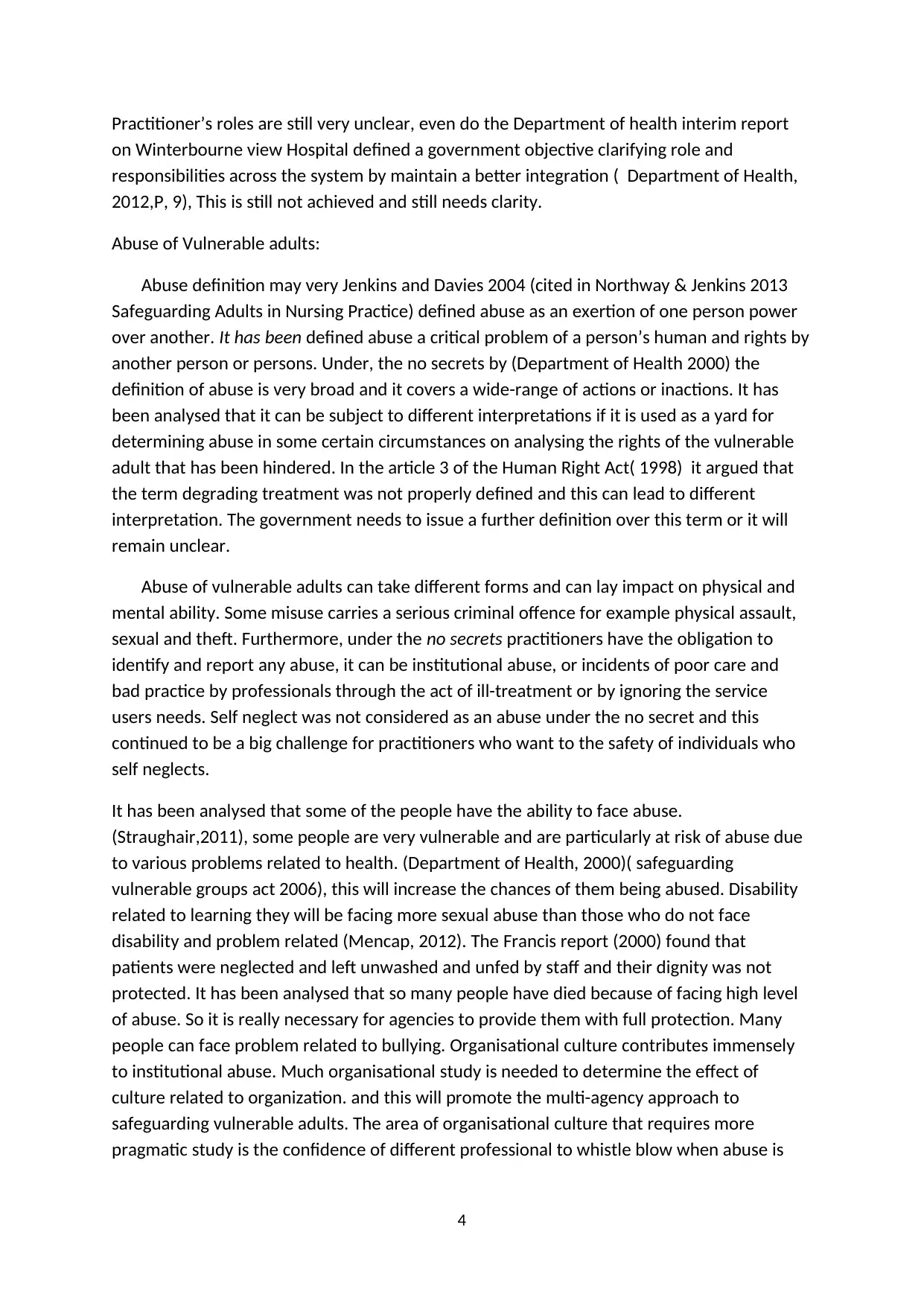
Practitioner’s roles are still very unclear, even do the Department of health interim report
on Winterbourne view Hospital defined a government objective clarifying role and
responsibilities across the system by maintain a better integration ( Department of Health,
2012,P, 9), This is still not achieved and still needs clarity.
Abuse of Vulnerable adults:
Abuse definition may very Jenkins and Davies 2004 (cited in Northway & Jenkins 2013
Safeguarding Adults in Nursing Practice) defined abuse as an exertion of one person power
over another. It has been defined abuse a critical problem of a person’s human and rights by
another person or persons. Under, the no secrets by (Department of Health 2000) the
definition of abuse is very broad and it covers a wide-range of actions or inactions. It has
been analysed that it can be subject to different interpretations if it is used as a yard for
determining abuse in some certain circumstances on analysing the rights of the vulnerable
adult that has been hindered. In the article 3 of the Human Right Act( 1998) it argued that
the term degrading treatment was not properly defined and this can lead to different
interpretation. The government needs to issue a further definition over this term or it will
remain unclear.
Abuse of vulnerable adults can take different forms and can lay impact on physical and
mental ability. Some misuse carries a serious criminal offence for example physical assault,
sexual and theft. Furthermore, under the no secrets practitioners have the obligation to
identify and report any abuse, it can be institutional abuse, or incidents of poor care and
bad practice by professionals through the act of ill-treatment or by ignoring the service
users needs. Self neglect was not considered as an abuse under the no secret and this
continued to be a big challenge for practitioners who want to the safety of individuals who
self neglects.
It has been analysed that some of the people have the ability to face abuse.
(Straughair,2011), some people are very vulnerable and are particularly at risk of abuse due
to various problems related to health. (Department of Health, 2000)( safeguarding
vulnerable groups act 2006), this will increase the chances of them being abused. Disability
related to learning they will be facing more sexual abuse than those who do not face
disability and problem related (Mencap, 2012). The Francis report (2000) found that
patients were neglected and left unwashed and unfed by staff and their dignity was not
protected. It has been analysed that so many people have died because of facing high level
of abuse. So it is really necessary for agencies to provide them with full protection. Many
people can face problem related to bullying. Organisational culture contributes immensely
to institutional abuse. Much organisational study is needed to determine the effect of
culture related to organization. and this will promote the multi-agency approach to
safeguarding vulnerable adults. The area of organisational culture that requires more
pragmatic study is the confidence of different professional to whistle blow when abuse is
4
on Winterbourne view Hospital defined a government objective clarifying role and
responsibilities across the system by maintain a better integration ( Department of Health,
2012,P, 9), This is still not achieved and still needs clarity.
Abuse of Vulnerable adults:
Abuse definition may very Jenkins and Davies 2004 (cited in Northway & Jenkins 2013
Safeguarding Adults in Nursing Practice) defined abuse as an exertion of one person power
over another. It has been defined abuse a critical problem of a person’s human and rights by
another person or persons. Under, the no secrets by (Department of Health 2000) the
definition of abuse is very broad and it covers a wide-range of actions or inactions. It has
been analysed that it can be subject to different interpretations if it is used as a yard for
determining abuse in some certain circumstances on analysing the rights of the vulnerable
adult that has been hindered. In the article 3 of the Human Right Act( 1998) it argued that
the term degrading treatment was not properly defined and this can lead to different
interpretation. The government needs to issue a further definition over this term or it will
remain unclear.
Abuse of vulnerable adults can take different forms and can lay impact on physical and
mental ability. Some misuse carries a serious criminal offence for example physical assault,
sexual and theft. Furthermore, under the no secrets practitioners have the obligation to
identify and report any abuse, it can be institutional abuse, or incidents of poor care and
bad practice by professionals through the act of ill-treatment or by ignoring the service
users needs. Self neglect was not considered as an abuse under the no secret and this
continued to be a big challenge for practitioners who want to the safety of individuals who
self neglects.
It has been analysed that some of the people have the ability to face abuse.
(Straughair,2011), some people are very vulnerable and are particularly at risk of abuse due
to various problems related to health. (Department of Health, 2000)( safeguarding
vulnerable groups act 2006), this will increase the chances of them being abused. Disability
related to learning they will be facing more sexual abuse than those who do not face
disability and problem related (Mencap, 2012). The Francis report (2000) found that
patients were neglected and left unwashed and unfed by staff and their dignity was not
protected. It has been analysed that so many people have died because of facing high level
of abuse. So it is really necessary for agencies to provide them with full protection. Many
people can face problem related to bullying. Organisational culture contributes immensely
to institutional abuse. Much organisational study is needed to determine the effect of
culture related to organization. and this will promote the multi-agency approach to
safeguarding vulnerable adults. The area of organisational culture that requires more
pragmatic study is the confidence of different professional to whistle blow when abuse is
4
Paraphrase This Document
Need a fresh take? Get an instant paraphrase of this document with our AI Paraphraser
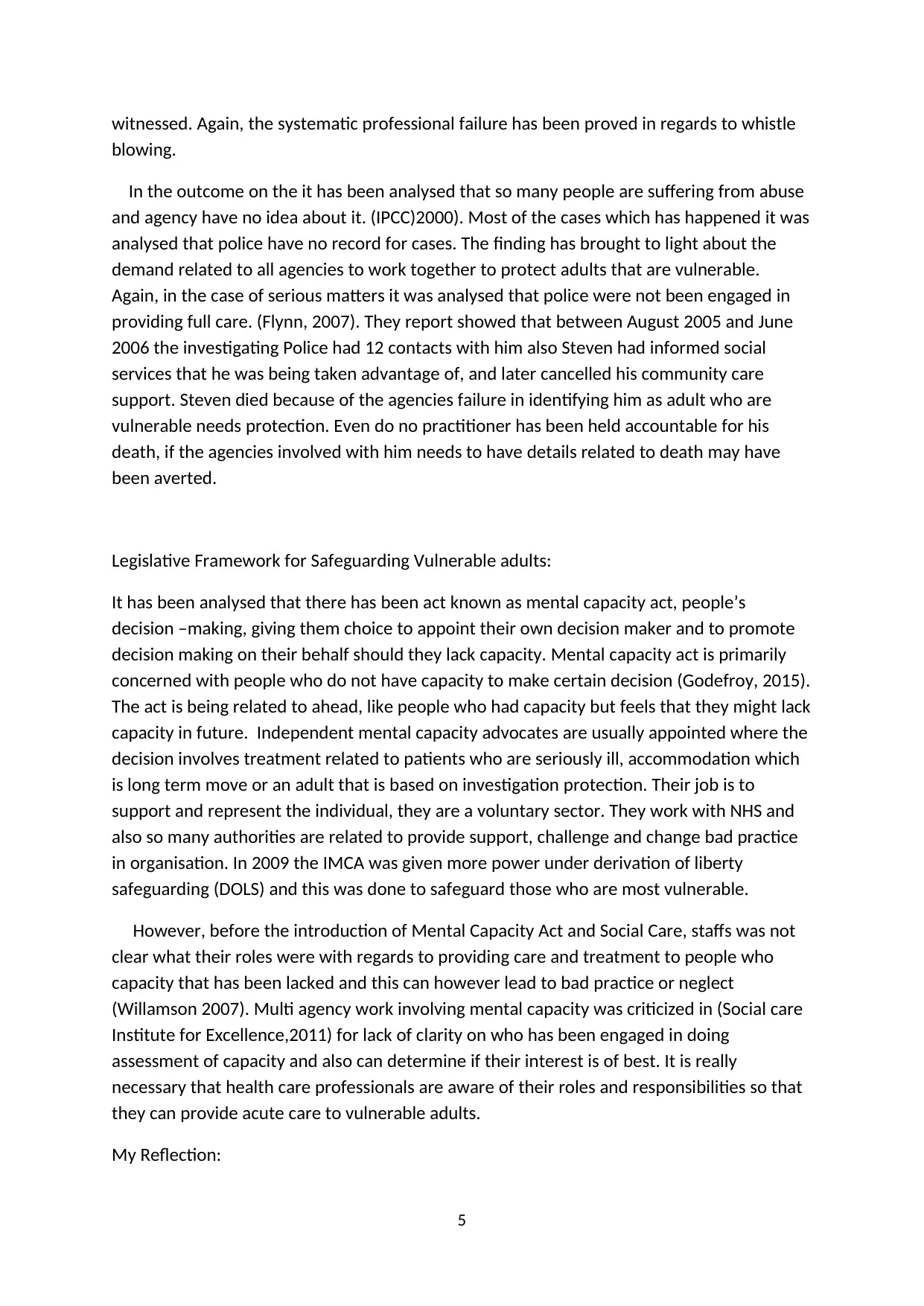
witnessed. Again, the systematic professional failure has been proved in regards to whistle
blowing.
In the outcome on the it has been analysed that so many people are suffering from abuse
and agency have no idea about it. (IPCC)2000). Most of the cases which has happened it was
analysed that police have no record for cases. The finding has brought to light about the
demand related to all agencies to work together to protect adults that are vulnerable.
Again, in the case of serious matters it was analysed that police were not been engaged in
providing full care. (Flynn, 2007). They report showed that between August 2005 and June
2006 the investigating Police had 12 contacts with him also Steven had informed social
services that he was being taken advantage of, and later cancelled his community care
support. Steven died because of the agencies failure in identifying him as adult who are
vulnerable needs protection. Even do no practitioner has been held accountable for his
death, if the agencies involved with him needs to have details related to death may have
been averted.
Legislative Framework for Safeguarding Vulnerable adults:
It has been analysed that there has been act known as mental capacity act, people’s
decision –making, giving them choice to appoint their own decision maker and to promote
decision making on their behalf should they lack capacity. Mental capacity act is primarily
concerned with people who do not have capacity to make certain decision (Godefroy, 2015).
The act is being related to ahead, like people who had capacity but feels that they might lack
capacity in future. Independent mental capacity advocates are usually appointed where the
decision involves treatment related to patients who are seriously ill, accommodation which
is long term move or an adult that is based on investigation protection. Their job is to
support and represent the individual, they are a voluntary sector. They work with NHS and
also so many authorities are related to provide support, challenge and change bad practice
in organisation. In 2009 the IMCA was given more power under derivation of liberty
safeguarding (DOLS) and this was done to safeguard those who are most vulnerable.
However, before the introduction of Mental Capacity Act and Social Care, staffs was not
clear what their roles were with regards to providing care and treatment to people who
capacity that has been lacked and this can however lead to bad practice or neglect
(Willamson 2007). Multi agency work involving mental capacity was criticized in (Social care
Institute for Excellence,2011) for lack of clarity on who has been engaged in doing
assessment of capacity and also can determine if their interest is of best. It is really
necessary that health care professionals are aware of their roles and responsibilities so that
they can provide acute care to vulnerable adults.
My Reflection:
5
blowing.
In the outcome on the it has been analysed that so many people are suffering from abuse
and agency have no idea about it. (IPCC)2000). Most of the cases which has happened it was
analysed that police have no record for cases. The finding has brought to light about the
demand related to all agencies to work together to protect adults that are vulnerable.
Again, in the case of serious matters it was analysed that police were not been engaged in
providing full care. (Flynn, 2007). They report showed that between August 2005 and June
2006 the investigating Police had 12 contacts with him also Steven had informed social
services that he was being taken advantage of, and later cancelled his community care
support. Steven died because of the agencies failure in identifying him as adult who are
vulnerable needs protection. Even do no practitioner has been held accountable for his
death, if the agencies involved with him needs to have details related to death may have
been averted.
Legislative Framework for Safeguarding Vulnerable adults:
It has been analysed that there has been act known as mental capacity act, people’s
decision –making, giving them choice to appoint their own decision maker and to promote
decision making on their behalf should they lack capacity. Mental capacity act is primarily
concerned with people who do not have capacity to make certain decision (Godefroy, 2015).
The act is being related to ahead, like people who had capacity but feels that they might lack
capacity in future. Independent mental capacity advocates are usually appointed where the
decision involves treatment related to patients who are seriously ill, accommodation which
is long term move or an adult that is based on investigation protection. Their job is to
support and represent the individual, they are a voluntary sector. They work with NHS and
also so many authorities are related to provide support, challenge and change bad practice
in organisation. In 2009 the IMCA was given more power under derivation of liberty
safeguarding (DOLS) and this was done to safeguard those who are most vulnerable.
However, before the introduction of Mental Capacity Act and Social Care, staffs was not
clear what their roles were with regards to providing care and treatment to people who
capacity that has been lacked and this can however lead to bad practice or neglect
(Willamson 2007). Multi agency work involving mental capacity was criticized in (Social care
Institute for Excellence,2011) for lack of clarity on who has been engaged in doing
assessment of capacity and also can determine if their interest is of best. It is really
necessary that health care professionals are aware of their roles and responsibilities so that
they can provide acute care to vulnerable adults.
My Reflection:
5
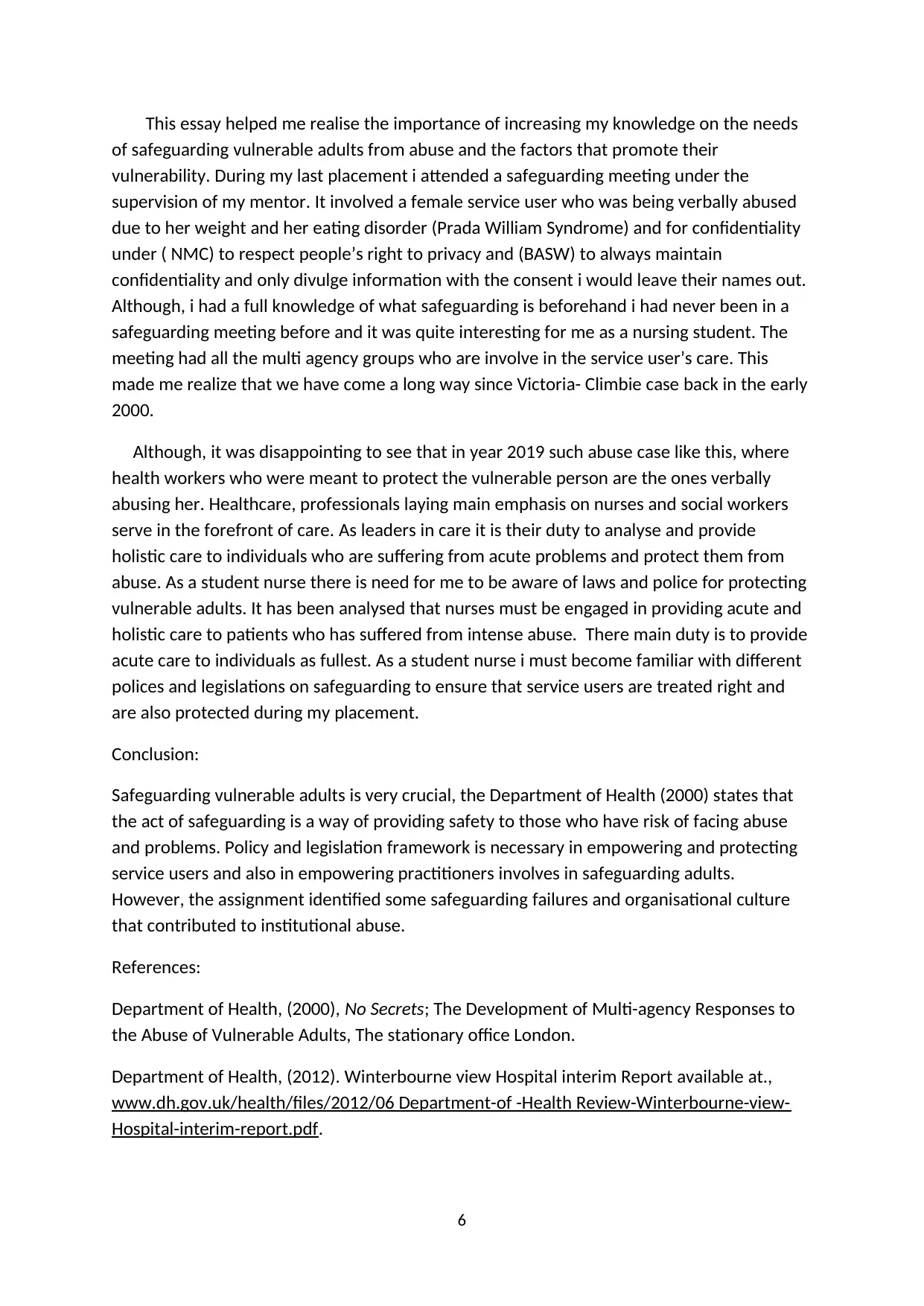
This essay helped me realise the importance of increasing my knowledge on the needs
of safeguarding vulnerable adults from abuse and the factors that promote their
vulnerability. During my last placement i attended a safeguarding meeting under the
supervision of my mentor. It involved a female service user who was being verbally abused
due to her weight and her eating disorder (Prada William Syndrome) and for confidentiality
under ( NMC) to respect people’s right to privacy and (BASW) to always maintain
confidentiality and only divulge information with the consent i would leave their names out.
Although, i had a full knowledge of what safeguarding is beforehand i had never been in a
safeguarding meeting before and it was quite interesting for me as a nursing student. The
meeting had all the multi agency groups who are involve in the service user’s care. This
made me realize that we have come a long way since Victoria- Climbie case back in the early
2000.
Although, it was disappointing to see that in year 2019 such abuse case like this, where
health workers who were meant to protect the vulnerable person are the ones verbally
abusing her. Healthcare, professionals laying main emphasis on nurses and social workers
serve in the forefront of care. As leaders in care it is their duty to analyse and provide
holistic care to individuals who are suffering from acute problems and protect them from
abuse. As a student nurse there is need for me to be aware of laws and police for protecting
vulnerable adults. It has been analysed that nurses must be engaged in providing acute and
holistic care to patients who has suffered from intense abuse. There main duty is to provide
acute care to individuals as fullest. As a student nurse i must become familiar with different
polices and legislations on safeguarding to ensure that service users are treated right and
are also protected during my placement.
Conclusion:
Safeguarding vulnerable adults is very crucial, the Department of Health (2000) states that
the act of safeguarding is a way of providing safety to those who have risk of facing abuse
and problems. Policy and legislation framework is necessary in empowering and protecting
service users and also in empowering practitioners involves in safeguarding adults.
However, the assignment identified some safeguarding failures and organisational culture
that contributed to institutional abuse.
References:
Department of Health, (2000), No Secrets; The Development of Multi-agency Responses to
the Abuse of Vulnerable Adults, The stationary office London.
Department of Health, (2012). Winterbourne view Hospital interim Report available at.,
www.dh.gov.uk/health/files/2012/06 Department-of -Health Review-Winterbourne-view-
Hospital-interim-report.pdf.
6
of safeguarding vulnerable adults from abuse and the factors that promote their
vulnerability. During my last placement i attended a safeguarding meeting under the
supervision of my mentor. It involved a female service user who was being verbally abused
due to her weight and her eating disorder (Prada William Syndrome) and for confidentiality
under ( NMC) to respect people’s right to privacy and (BASW) to always maintain
confidentiality and only divulge information with the consent i would leave their names out.
Although, i had a full knowledge of what safeguarding is beforehand i had never been in a
safeguarding meeting before and it was quite interesting for me as a nursing student. The
meeting had all the multi agency groups who are involve in the service user’s care. This
made me realize that we have come a long way since Victoria- Climbie case back in the early
2000.
Although, it was disappointing to see that in year 2019 such abuse case like this, where
health workers who were meant to protect the vulnerable person are the ones verbally
abusing her. Healthcare, professionals laying main emphasis on nurses and social workers
serve in the forefront of care. As leaders in care it is their duty to analyse and provide
holistic care to individuals who are suffering from acute problems and protect them from
abuse. As a student nurse there is need for me to be aware of laws and police for protecting
vulnerable adults. It has been analysed that nurses must be engaged in providing acute and
holistic care to patients who has suffered from intense abuse. There main duty is to provide
acute care to individuals as fullest. As a student nurse i must become familiar with different
polices and legislations on safeguarding to ensure that service users are treated right and
are also protected during my placement.
Conclusion:
Safeguarding vulnerable adults is very crucial, the Department of Health (2000) states that
the act of safeguarding is a way of providing safety to those who have risk of facing abuse
and problems. Policy and legislation framework is necessary in empowering and protecting
service users and also in empowering practitioners involves in safeguarding adults.
However, the assignment identified some safeguarding failures and organisational culture
that contributed to institutional abuse.
References:
Department of Health, (2000), No Secrets; The Development of Multi-agency Responses to
the Abuse of Vulnerable Adults, The stationary office London.
Department of Health, (2012). Winterbourne view Hospital interim Report available at.,
www.dh.gov.uk/health/files/2012/06 Department-of -Health Review-Winterbourne-view-
Hospital-interim-report.pdf.
6
⊘ This is a preview!⊘
Do you want full access?
Subscribe today to unlock all pages.

Trusted by 1+ million students worldwide
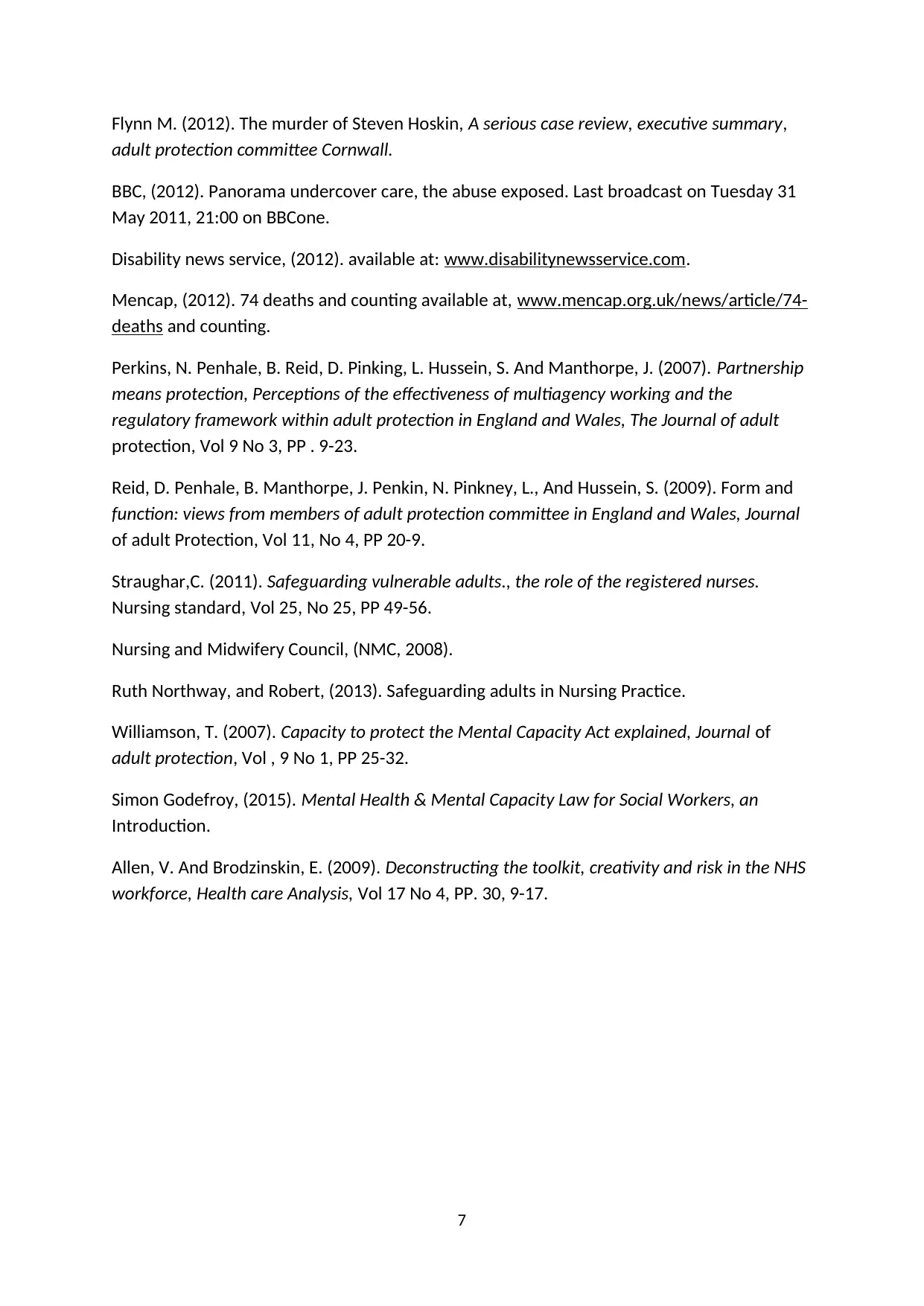
Flynn M. (2012). The murder of Steven Hoskin, A serious case review, executive summary,
adult protection committee Cornwall.
BBC, (2012). Panorama undercover care, the abuse exposed. Last broadcast on Tuesday 31
May 2011, 21:00 on BBCone.
Disability news service, (2012). available at: www.disabilitynewsservice.com.
Mencap, (2012). 74 deaths and counting available at, www.mencap.org.uk/news/article/74-
deaths and counting.
Perkins, N. Penhale, B. Reid, D. Pinking, L. Hussein, S. And Manthorpe, J. (2007). Partnership
means protection, Perceptions of the effectiveness of multiagency working and the
regulatory framework within adult protection in England and Wales, The Journal of adult
protection, Vol 9 No 3, PP . 9-23.
Reid, D. Penhale, B. Manthorpe, J. Penkin, N. Pinkney, L., And Hussein, S. (2009). Form and
function: views from members of adult protection committee in England and Wales, Journal
of adult Protection, Vol 11, No 4, PP 20-9.
Straughar,C. (2011). Safeguarding vulnerable adults., the role of the registered nurses.
Nursing standard, Vol 25, No 25, PP 49-56.
Nursing and Midwifery Council, (NMC, 2008).
Ruth Northway, and Robert, (2013). Safeguarding adults in Nursing Practice.
Williamson, T. (2007). Capacity to protect the Mental Capacity Act explained, Journal of
adult protection, Vol , 9 No 1, PP 25-32.
Simon Godefroy, (2015). Mental Health & Mental Capacity Law for Social Workers, an
Introduction.
Allen, V. And Brodzinskin, E. (2009). Deconstructing the toolkit, creativity and risk in the NHS
workforce, Health care Analysis, Vol 17 No 4, PP. 30, 9-17.
7
adult protection committee Cornwall.
BBC, (2012). Panorama undercover care, the abuse exposed. Last broadcast on Tuesday 31
May 2011, 21:00 on BBCone.
Disability news service, (2012). available at: www.disabilitynewsservice.com.
Mencap, (2012). 74 deaths and counting available at, www.mencap.org.uk/news/article/74-
deaths and counting.
Perkins, N. Penhale, B. Reid, D. Pinking, L. Hussein, S. And Manthorpe, J. (2007). Partnership
means protection, Perceptions of the effectiveness of multiagency working and the
regulatory framework within adult protection in England and Wales, The Journal of adult
protection, Vol 9 No 3, PP . 9-23.
Reid, D. Penhale, B. Manthorpe, J. Penkin, N. Pinkney, L., And Hussein, S. (2009). Form and
function: views from members of adult protection committee in England and Wales, Journal
of adult Protection, Vol 11, No 4, PP 20-9.
Straughar,C. (2011). Safeguarding vulnerable adults., the role of the registered nurses.
Nursing standard, Vol 25, No 25, PP 49-56.
Nursing and Midwifery Council, (NMC, 2008).
Ruth Northway, and Robert, (2013). Safeguarding adults in Nursing Practice.
Williamson, T. (2007). Capacity to protect the Mental Capacity Act explained, Journal of
adult protection, Vol , 9 No 1, PP 25-32.
Simon Godefroy, (2015). Mental Health & Mental Capacity Law for Social Workers, an
Introduction.
Allen, V. And Brodzinskin, E. (2009). Deconstructing the toolkit, creativity and risk in the NHS
workforce, Health care Analysis, Vol 17 No 4, PP. 30, 9-17.
7
1 out of 7
Related Documents
Your All-in-One AI-Powered Toolkit for Academic Success.
+13062052269
info@desklib.com
Available 24*7 on WhatsApp / Email
![[object Object]](/_next/static/media/star-bottom.7253800d.svg)
Unlock your academic potential
Copyright © 2020–2026 A2Z Services. All Rights Reserved. Developed and managed by ZUCOL.





